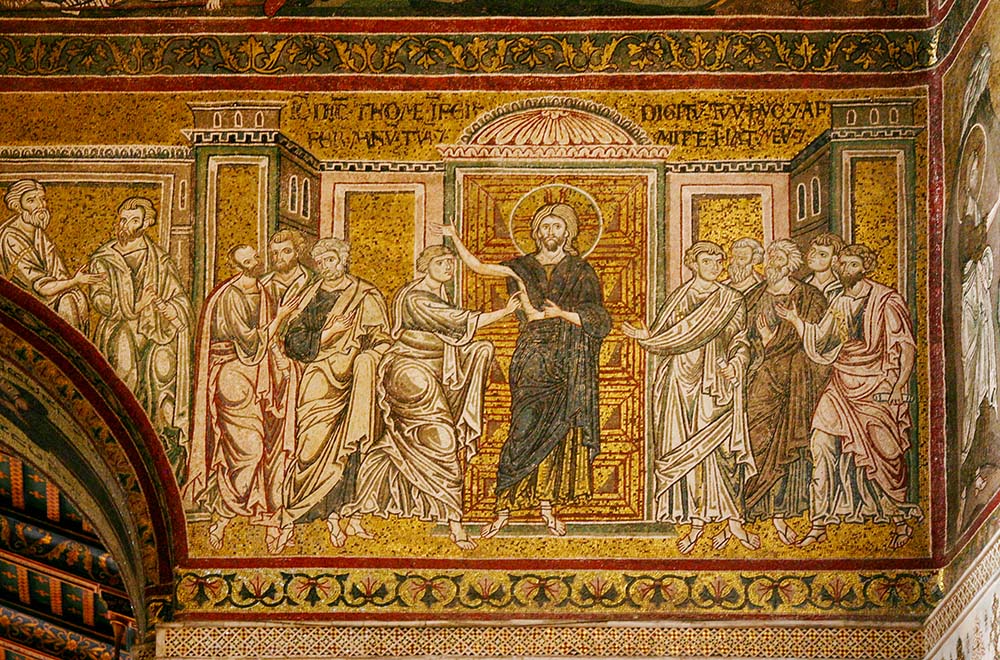
A mosaic at the Cathedral of Monreale, Italy, depicts the resurrected Christ appearing to the apostles. (Wikimedia Commons/José Luiz Bernardes Ribeiro/CC BY-SA 4.0)
When, try as I might, I could not be at peace with other options, I finally gave in to what I sensed as a call to religious life, knowing full well that it was no longer in style. Nationally, religious practice was waning among the young, and women were beginning to speak out about how the church failed to recognize us, our ability to contribute and our full status as members of the body of Christ.
For me, becoming a woman religious was about belonging to a community in mission, and I accepted being an oddity, even among Catholics. Sensitive about the choice, I didn't want anyone to know about it until I took a definitive step. Although I felt fairly certain of my vocation, I had no idea how I would be changed by joining with others who shared the same call and mission.
The idea of unpredictable personal change leads me to today's Liturgy of the Word.
Today's Gospel pulls together at least seven themes: fear, peace, evil overcome, forgiveness, mission, and apostolic faith — all of which are Easter experiences. The disciples who locked themselves into safety had heard the women proclaim the Resurrection, but they didn't really believe it. They continued hiding from the danger that flowed from their relationship with Jesus.
Then, he burst in on their desolation. His response to their fear? "Peace."
"Peace," revealed his experience of death overcome, of the evil and suffering incapable of eliminating him, of the Father's assurance that all he had said and done had been true. "Peace," communicated his gift of the Spirit and the freedom to forgive anything and everyone. "Peace" commissioned his disciples to act in his name.
Peace gave them courage and would be the hallmark of their apostolate, the sign that they were moving through him and with him and in him. Peace communicates divine mercy, the reality that God shares our experience and remains present in our need.
Today's selection from the Acts of the Apostles reveals the results of receiving the gift of peace and God's merciful presence. First, it helps to remember that the title "apostle" is broader than we might think. Jesus appointed exactly 12 apostles to symbolize a new Israel, but others like Paul and Barnabas also claimed the title. Calling people apostles indicated that Christ had empowered them to spread the Gospel. Of course, Mary of Magdala holds the honor of being the first one delegated to announce the Resurrection.
By the time Gentiles were becoming the majority among Christians, the label designated a risky job description more than an honorary title. That's why some "others" avoided being identified with the followers of the executed Jesus. For the next 313 years, it was risky to be branded as a follower of Christ. It still is for many.
This leads us into today's selection from the Book of Revelation. The author explains that he shares in common with his readers a confounding combination of distress, kingdom, endurance, and exile: the exact sort of circumstances that the "others" shunned.
Advertisement
And yet, as we heard in the readings for Easter Sunday, such hard times help us recognize the presence of God, the one who says, "I am the first and the last, the One who lives." At some level, in spite of all our disturbance, we can believe that God-Emmanuel is somehow still near.
Our tradition tells us that Thomas did not believe. Of course he didn't! Those who told him that Christ was risen were still hiding out, displaying no signs of sharing in Jesus' peace. They hadn't changed. Belief in their unsubstantiated tales would have been a shallow and easily lost conviction.
When Jesus and Thomas faced each other, when Thomas could see scars healed and heard the crucified one speaking, he knew that his Master was truly in and with God. Then, he experienced Christ's peace, a faith that changed him irrevocably. Having known the depths of doubt and sorrow, he was prepared to be an apostle.
The Easter season is longer than Lent, perhaps because it's easy to do penance, but allowing Christ's peace to permeate our hearts and minds takes much longer. The Easter season offers us the opportunity to let ourselves be perplexed and even to doubt as we wait for the good news to saturate our souls.
How to do that? We can't begin without gazing on and touching the living Christ's wounds in our own time, letting the suffering in our world move us as Christ's passion moved Thomas. Evil is as present today as then. We need to grieve over the situations that break our hearts and challenge our faith.
From that vulnerable space, we can hear Christ's "peace," and we will be transformed as authentic apostles.
